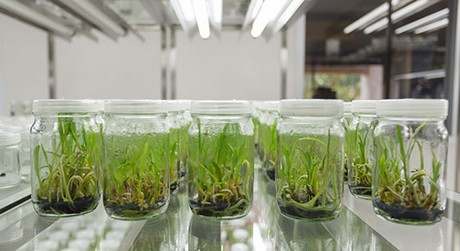In the ever-evolving landscape of agriculture, where innovation is key to sustainable growth, one groundbreaking technique is taking center stage – Micropropagation. This method holds the promise of revolutionizing the way we cultivate crops, ensuring increased yields, better resource utilization, and overall improved agricultural efficiency.
Read more about Parthenocarpy
Contents
Unveiling the Potential of Micropropagation
Agricultural Efficiency Redefined
Micropropagation, often referred to as tissue culture, involves the aseptic culture of plant cells, tissues, or organs in a nutrient medium under controlled conditions. This precise and controlled environment allows for the rapid multiplication of plants, free from contaminants and diseases. The result is an enhanced ability to produce a large number of uniform, high-quality plants in a relatively short timeframe.
Addressing Agricultural Challenges
Traditional agricultural practices face numerous challenges, from unpredictable weather patterns to soil degradation. Micropropagation presents itself as a solution, allowing farmers to bypass some of these challenges. The controlled environment eliminates the risk of pests and diseases, reducing the need for chemical interventions. This not only ensures healthier crops but also promotes sustainable and environmentally friendly farming practices.

The Key Benefits of Micropropagation
1. Increased Yield
Micropropagation enables the mass production of plants with consistent genetic traits. This uniformity translates to higher yields, providing farmers with a reliable and predictable harvest. The ability to control the growth conditions ensures optimal plant development, further contributing to increased productivity.
2. Resource Optimization
In traditional agriculture, vast amounts of resources such as water, land, and fertilizers are utilized to sustain crop growth. Micropropagation minimizes these resource requirements by accelerating plant growth and reducing the space needed for cultivation. This not only conserves resources but also makes agriculture more economically viable.
3. Rapid Crop Improvement
The controlled environment of micropropagation allows for rapid experimentation and genetic modification. This accelerates the process of developing crops with desirable traits, whether it be drought resistance, pest tolerance, or improved nutritional content. The speed at which these advancements can be achieved is unparalleled, offering a swift response to emerging agricultural challenges.
Future Implications and Global Adoption
Shaping the Agricultural Landscape
As technology continues to drive progress in agriculture, the adoption of micropropagation is poised to reshape the global agricultural landscape. The scalability and efficiency of this technique make it a viable solution for both small-scale and large-scale farming operations, ensuring food security in the face of a growing global population.
Global Collaboration for Sustainable Agriculture
The potential of micropropagation extends beyond individual farms. Collaborative efforts on a global scale can harness the power of this technique to address food shortages, promote sustainable practices, and mitigate the impact of climate change on agriculture. It is a shared responsibility to explore and implement innovative solutions for the benefit of the entire planet.
Conclusion
Micropropagation stands as a beacon of hope for the future of agriculture. Its ability to enhance efficiency, increase yields, and address environmental challenges positions it as a cornerstone of sustainable farming practices. As we navigate the complexities of the modern agricultural landscape, embracing innovations like micropropagation is not just an option but a necessity. The seeds of change have been sown, and it’s time for agriculture to reap the benefits.




[…] Read more about Future of Agriculture […]